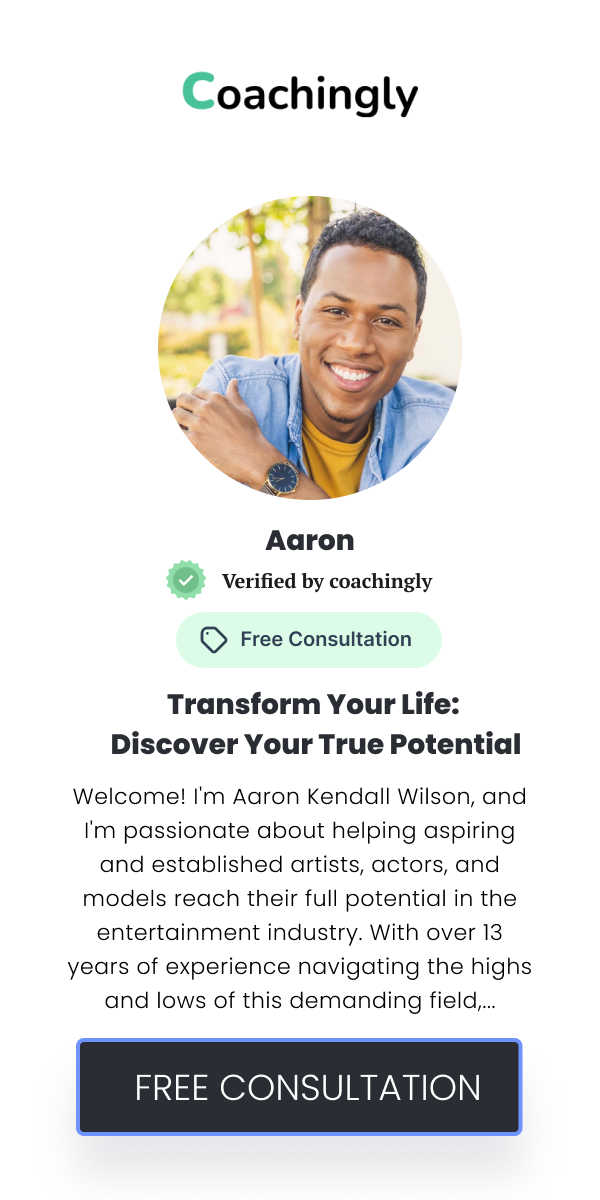
How to Turn Rejection into Opportunity in the Entertainment Industry
![]() Aaron Kendall Wilson
Aaron Kendall Wilson
![]() September 09, 2024
September 09, 2024
In the entertainment industry, rejection is an all-too-common experience for artists at every level, from aspiring actors and musicians to seasoned professionals. This reality manifests in various forms, such as being turned down for auditions, receiving negative feedback on performances, or finding that your creative submissions didn't resonate with decision-makers. Each rejection can feel like a personal setback, leading to feelings of inadequacy, frustration, and self-doubt. The psychological toll can be significant, especially in an industry where personal identity and professional success often intertwine. For many artists, these experiences can become barriers to growth and creativity, leading them to withdraw or second-guess their talents. However, developing a resilient mindset is essential for navigating these challenges. Recognizing that rejection is an inherent part of the journey can be liberating. It opens the door to personal growth and new opportunities that might otherwise go unnoticed. Rejection can also provide valuable insights. It forces artists to confront their vulnerabilities and encourages them to adapt and evolve. This is particularly important in an industry that thrives on innovation and originality. Instead of viewing rejection as an endpoint, artists can see it as a stepping stone towards improvement. The ability to embrace rejection as a normal aspect of the creative process can transform the experience into a powerful motivator for artistic evolution. By shifting the focus from personal failure to the potential for growth, artists can better equip themselves to navigate the competitive landscape of the entertainment world. Ultimately, understanding rejection as a common challenge faced by many can foster a sense of community among artists, reminding them that they are not alone in their experiences. Rejection resilience training offers a structured approach to handling the inevitable disappointments that come with pursuing a career in the entertainment industry. This concept revolves around building the emotional and psychological tools necessary to cope with rejection effectively. Unlike traditional emotional coping methods that might focus solely on avoidance or minimization of negative feelings, rejection resilience training encourages individuals to confront their feelings head-on and to view them as opportunities for growth. It teaches artists to process their emotions constructively and to harness the energy from rejection to fuel their creative pursuits. The benefits of adopting rejection resilience are multifaceted. For one, it allows individuals to maintain their motivation even when faced with setbacks. This training can lead to a more profound understanding of one's artistic identity, enabling artists to better articulate their visions and ambitions. Additionally, it promotes a mindset of lifelong learning, where every rejection becomes a lesson rather than a defeat. Embracing this perspective can also reduce the stigma associated with failure, encouraging artists to take more risks in their work. When rejection is reframed as a natural part of the creative process, it becomes easier to engage in artistic exploration without the fear of judgment. Moreover, rejection resilience training can enhance an artist's ability to receive feedback constructively. Instead of viewing critiques as personal attacks, they can be seen as valuable insights that inform future work. This shift not only improves the quality of an artist's craft but also fosters a sense of camaraderie among peers. By recognizing that rejection is a shared experience, artists can support one another in their journeys. Ultimately, rejection resilience training not only helps individuals cope with immediate setbacks but also equips them with skills that will serve them throughout their careers. To cultivate rejection resilience, artists can employ several strategies that promote a healthy mindset and proactive response to setbacks. The first step involves shifting one's perspective. Viewing rejection as constructive feedback rather than an indication of failure can significantly alter an artist's response. This means embracing the notion that every "no" brings you one step closer to a "yes." It's essential to reflect on the feedback received, considering what can be learned from the experience. This process of self-reflection is crucial for personal and professional growth, allowing artists to adapt their approaches based on what they discover. Embracing vulnerability is another vital strategy. The entertainment industry often requires individuals to showcase their innermost selves, which can feel risky. However, the ability to put oneself out there is what makes art resonate with audiences. Building confidence despite potential rejection is essential; techniques such as positive affirmations and visualization can help artists feel more empowered in their pursuits. It's about learning to accept the discomfort that comes with vulnerability, which ultimately leads to greater authenticity in one's work. As artists continue to express themselves freely, they foster deeper connections with their audiences. Building a supportive network plays a critical role in developing rejection resilience as well. Surrounding oneself with positive influences - be it peers, mentors, or supportive friends - can create a nurturing environment that encourages growth. This network can provide invaluable feedback, motivation, and camaraderie, helping to alleviate the weight of rejection. Engaging in open discussions about rejection experiences can also normalize these feelings, fostering a sense of solidarity. When artists share their challenges and triumphs, they create a culture of encouragement that benefits everyone involved. Setting realistic expectations is also crucial in cultivating resilience. Recognizing that the entertainment industry is inherently unpredictable allows artists to navigate it with a more balanced mindset. Goals should be adaptable and grounded in the understanding that success is often a winding road. By setting short-term, achievable objectives alongside long-term aspirations, artists can maintain their focus and motivation. This balanced approach helps to prevent discouragement, as it emphasizes progress rather than perfection. Finally, maintaining a consistent practice of self-care is essential. Engaging in activities that replenish creativity and well-being can counteract the emotional toll of rejection. Whether through physical exercise, meditation, or engaging in hobbies outside of the industry, these practices help create a more resilient mindset. By prioritizing mental health and well-being, artists can enhance their capacity to face challenges and setbacks. When rejection occurs, it's vital to turn that experience into constructive action. Analyzing the reasons behind the rejection can provide insights that inform future efforts. Rather than wallowing in disappointment, artists should take time to reflect on any feedback received and consider how it can be applied moving forward. This critical examination can help identify specific areas for improvement, allowing individuals to focus on honing their skills and talents. Setting new goals is another effective strategy for transforming rejection into opportunity. After a setback, it's important to reassess one's ambitions and redefine them if necessary. This process can involve both short-term and long-term goal setting, tailored to inspire renewed motivation. For instance, after a rejected audition, an actor might set a goal to take a specific acting class or workshop to build new skills. This proactive approach not only redirects focus but also instils a sense of purpose that can mitigate the emotional impact of rejection. Staying committed to one's artistic vision is equally important. The entertainment industry can be rife with ups and downs, and maintaining motivation is crucial. Establishing routines or practices that reinforce commitment can be beneficial. Regularly revisiting the reasons for pursuing a career in the arts can provide the motivation needed to push through challenging times. This connection to personal passion can reignite enthusiasm and drive, encouraging artists to keep pursuing their dreams despite setbacks. Moreover, artists can leverage their experiences of rejection to fuel their creativity. Many successful entertainers have spoken about how their disappointments have inspired their work. Whether through songwriting, acting, or any other form of artistic expression, the emotions associated with rejection can lead to powerful creations. This transformation of pain into art not only helps artists process their experiences but also resonates deeply with audiences who may relate to those struggles. Networking can also play a pivotal role in turning rejection into opportunity. Instead of avoiding connections after a setback, artists should engage with industry peers, using their experiences as conversation starters. Networking provides a platform to learn from others and share experiences, which can lead to new opportunities and collaborations. By remaining visible and active within the community, artists can turn a "no" into a potential "not yet," fostering relationships that could bear fruit in the future. For those looking to strengthen their rejection resilience, numerous resources are available that focus on personal and professional development. Books that delve into emotional resilience, creative courage, and overcoming self-doubt can provide valuable insights and strategies. Titles such as "The Gifts of Imperfection" by Bren Brown and "Big Magic" by Elizabeth Gilbert offer perspectives on embracing vulnerability and pursuing creativity despite fear of rejection. Workshops and online courses centred around rejection resilience training can also be beneficial, providing practical tools and exercises tailored for artists. Additionally, engaging with communities of like-minded individuals can foster a supportive environment where artists can share experiences and strategies for overcoming rejection. Online forums, social media groups, and local meet-ups can provide spaces for discussion, encouragement, and collaboration. Building relationships within these communities can lead to valuable connections, resources, and opportunities that might not have been accessible otherwise. Consider exploring mentorship opportunities as well. Many successful artists are willing to share their insights and experiences with those who are just starting. Finding a mentor can guide through the complex landscape of the entertainment industry. They can offer personal advice on navigating rejection and help cultivate resilience through their own experiences. Finally, ongoing education is crucial for personal growth in any field, particularly in the dynamic world of entertainment. Taking courses that focus on skill enhancement, networking, or even personal development can empower artists to turn setbacks into stepping stones. By continuously learning and evolving, individuals can position themselves for success, making rejection a mere blip on their path to achievement. Embracing rejection as part of the journey allows artists in the entertainment industry to foster resilience and turn setbacks into opportunities for growth. By shifting perspectives, engaging in rejection resilience training, and actively seeking constructive actions, individuals can navigate their artistic paths with renewed energy and commitment. The journey may be fraught with challenges, but by cultivating resilience, artists can truly transform rejection into something meaningful, paving the way for future opportunities and success.Understanding Rejection in the Entertainment Industry
The Concept of Rejection Resilience Training
Strategies for Cultivating Rejection Resilience
Turning Rejection into Constructive Action
Resources for Further Development

Recent Articles
How Stage Fright Can Propel Your Singing Career to the Next Level Without Delay
Before I discovered the secret...
![]() Oct 01, 2024
Oct 01, 2024
How Having No Experience as an Actor Can Be Used to Your Advantage
Before I discovered the hidden...
![]() Oct 01, 2024
Oct 01, 2024
Shy to Strong: The Evolution of a Confident
Before I understood the power ...
![]() Oct 01, 2024
Oct 01, 2024
The Hidden Power of Shyness: Crafting a Unique Presence in the Modeling World
In a world often dominated by ...
![]() Oct 08, 2024
Oct 08, 2024
Reimagining Inexperience: Transforming Your Acting Journey into an Asset
Stepping into the world of act...
![]() Oct 07, 2024
Oct 07, 2024
Why Embracing Stage Fright Can Skyrocket Your Music Career
Before I discovered how to lev...
![]() Oct 06, 2024
Oct 06, 2024
Transforming Stage Fright into a Powerful Tool for Your Singing Success
Before I uncovered the true po...
![]() Oct 05, 2024
Oct 05, 2024
The Confident Introvert: How Shyness Can Shape Your Modeling Identity
Shyness is often perceived as ...
![]() Oct 04, 2024
Oct 04, 2024
Embracing the Beginner's Mindset: Why Lack of Experience Can Spark Your Acting Success
Before I truly grasped the tra...
![]() Oct 03, 2024
Oct 03, 2024
From Shyness to Stardom: Turning Insecurity into Confidence in the Modeling Industry
Before I grasped how to levera...
![]() Oct 09, 2024
Oct 09, 2024
The Journey from Stage Fright to Stage Power: Lessons from My Music Career
Before I discovered the secret...
![]() Oct 10, 2024
Oct 10, 2024
